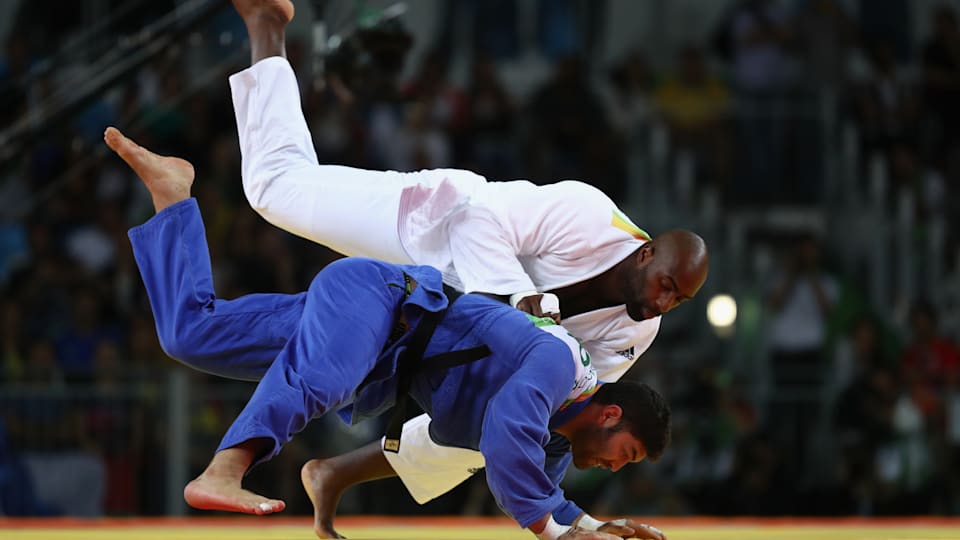New Teddy Riner – 26 kg lighter – finds renewed motivation ahead of Tokyo 2020
Heavyweight judoka, who was defeated twice last year after 10 years unbeaten, has changed his nutrition and training in an attempt to regain best form for the Games in 2021.

It would be a shock to anyone, after ten years undefeated, to be beaten in their sport. But to be beaten twice in those circumstances, in the same year?
Teddy Riner, the legendary double Olympic champion French heavyweight judoka, faced this exact dilemma last season, and it has provoked him into big changes.
The new and refreshed Riner is here and ready to fight for his Tokyo 2020 ambitions, after a 20-month break from the sport was followed by those two surprise losses.
"It's important to set the record straight and to send a strong message," the 31-year-old told L'Équipe. "Make them [his opponents] understand that the Olympics will be mine."
Double defeat
Riner's decade-long winning streak, which spanned 154 bouts, was ended in February 2020 on home soil at the Paris Grand Slam by Kageura Kokoro of Japan.
That, coupled with the first coronavirus lockdown in France, led to renewed motivation, as depicted in the documentary Teddy released last July.
"I am proud of what I did, but after 10 years, it weighs really heavy on your shoulders," he said. He began losing weight, dropping to 143 kg after the first confinement.
But another rude awakening was to follow. At the French national team championships in October, Joseph Terhec claimed a shock victory over Riner, who is a 10-time world champion.
"I don't think anyone likes to lose, especially not me," Riner said to RMC Sport.
However, he took the defeats in his stride.
"In any case, it allowed me to understand why these things happened, and why at that time. More than anything, what is good is that it happened before the (Tokyo 2020) Games. I prefer everything to happen to me before than at the Olympics.
"From there, you always have to take stock, understand the why and how and start again."
Big changes for Riner
There have been a number of important changes since then. His physical strength coach Yann Morisseau no longer conducts sessions with Riner, and his long-time sparring partner Nico Kanning no longer holds that position (and no one, as of yet, has been named to replace him).
The two losses were a wake-up call, Riner said.
"I asked myself what I really wanted," he told Le Parisien. "Am I going to Tokyo just to make up the numbers, or do I find a new way of working to set things straight?"
A change in diet followed for Riner, whose addiction to sweet treats was shown in the documentary following him.
The times when he used to ask his young son where the sweets and cakes were hidden were over, he admitted. The change in his nutrition has led him to drop a total of 26 kg from his heaviest weight to 139 kg, around his ideal judo weight.
Now, he is on a diet of green beans and chicken, among other more nutritious meals.
"I haven't weighted this light since the London (2012) Games," he said. "My nutritionists re-educated me in terms of food, a cook prepares the dishes for me. I eat balanced (meals) and at fixed times."
Feeling younger
The improved nutrition has also resulted in obvious physical improvements, Riner said.
"Frankly, I feel like I'm getting younger," he told RMC. "I really worked on all aspects, whether mental, physical, technical, judo, nutrition.
"Sometimes I may have forgotten in the past these little things, which resulted in these defeats. I've reset everything and really worked on all aspects and this is the result. I am 139 kilos today, I am very happy!
"It allows me to be faster (on the mat)."
His training includes more stretching, taught to him by a yoga teacher, to allow him to be more mobile and recover faster.
Disruptions
Although Riner has been able to train more often recently despite the ongoing pandemic, he has faced one major disruption as Tokyo 2020 looms large in 2021.
In a normal season, in addition to competitions, Riner would base himself in Japan for training camps.
"Especially since we've been unable to travel and thus participate in training camps abroad with heavyweights, it's a handicap," Riner said.
"In France, the chances to face heavyweights is quite limited since there are only two in training. It becomes problematic."
He added: "But this is how life is. We have to bounce back and find solutions. For now, I have not brought in anyone for sparring, but I will go to find competition, wherever it is."
His opponents have been put on alert. The new Riner is here, and he wants another Olympic title.
